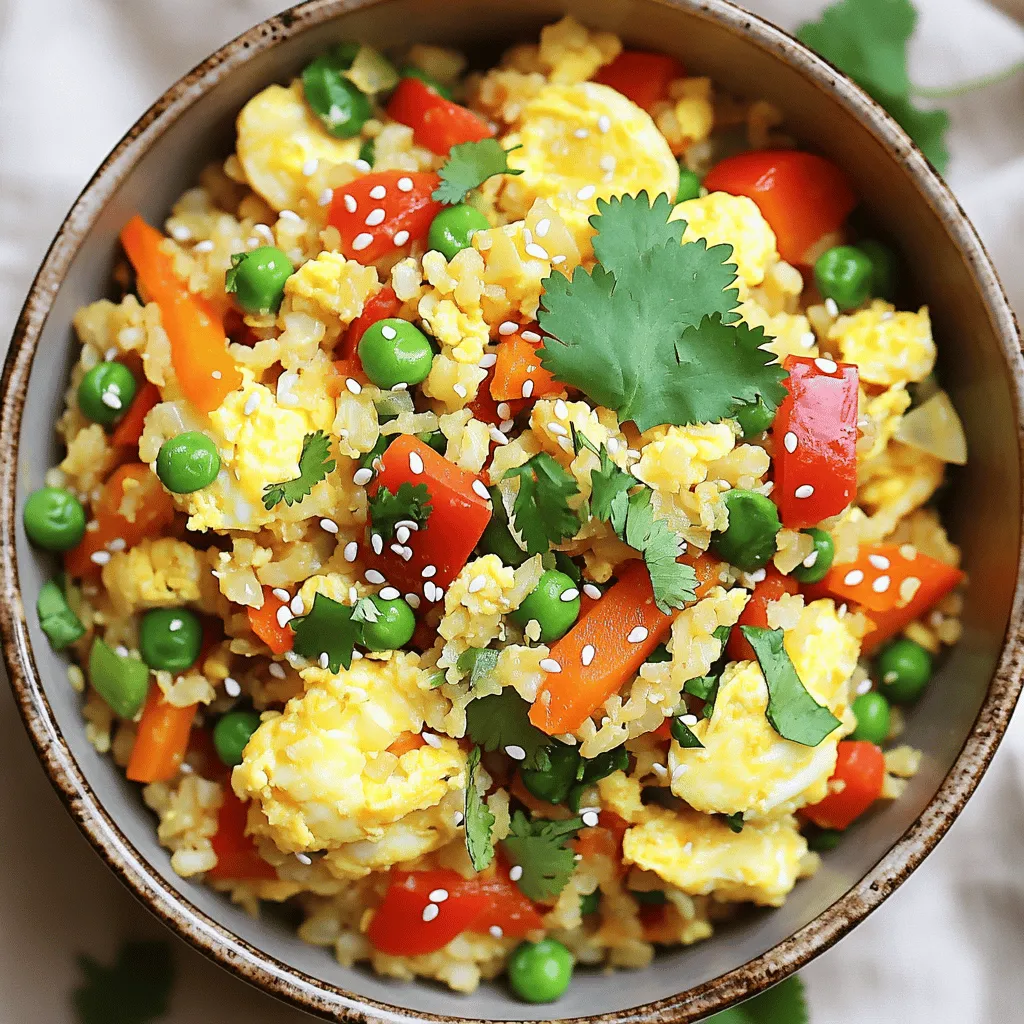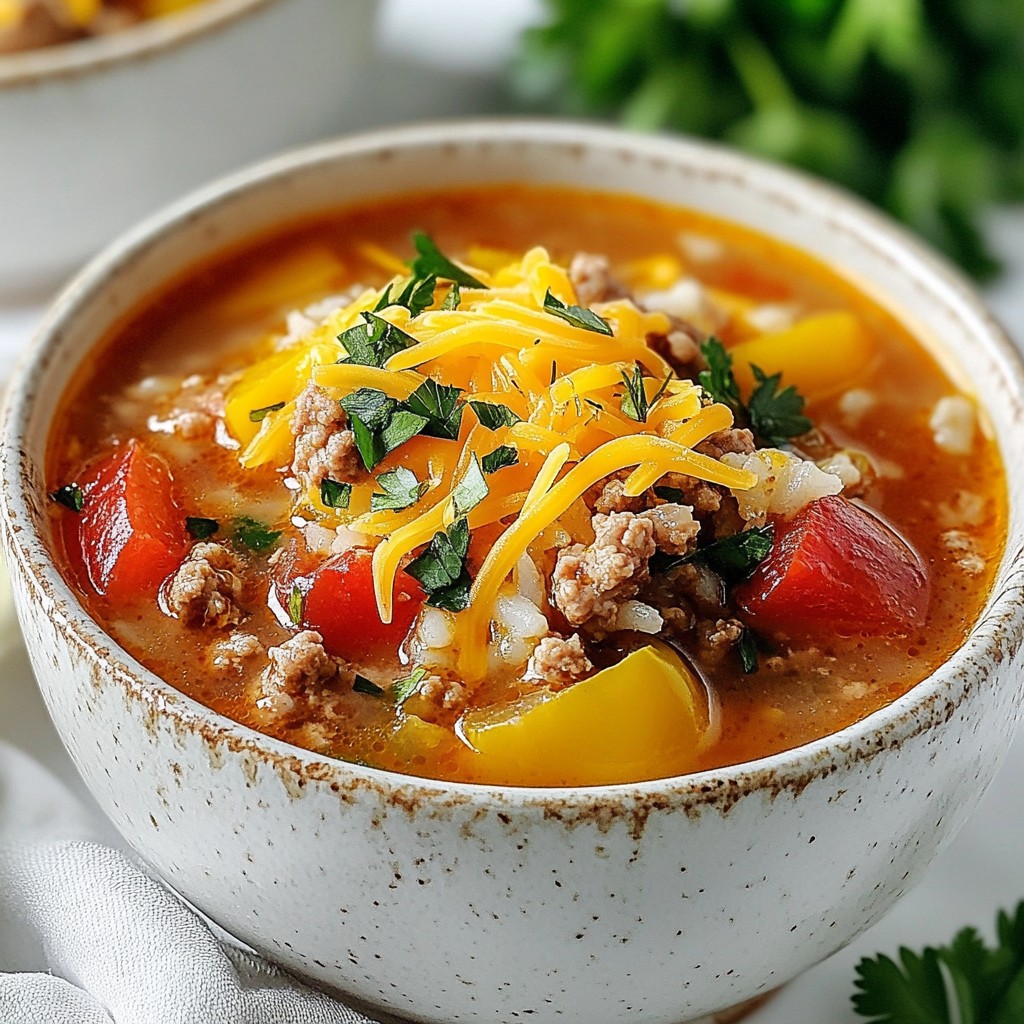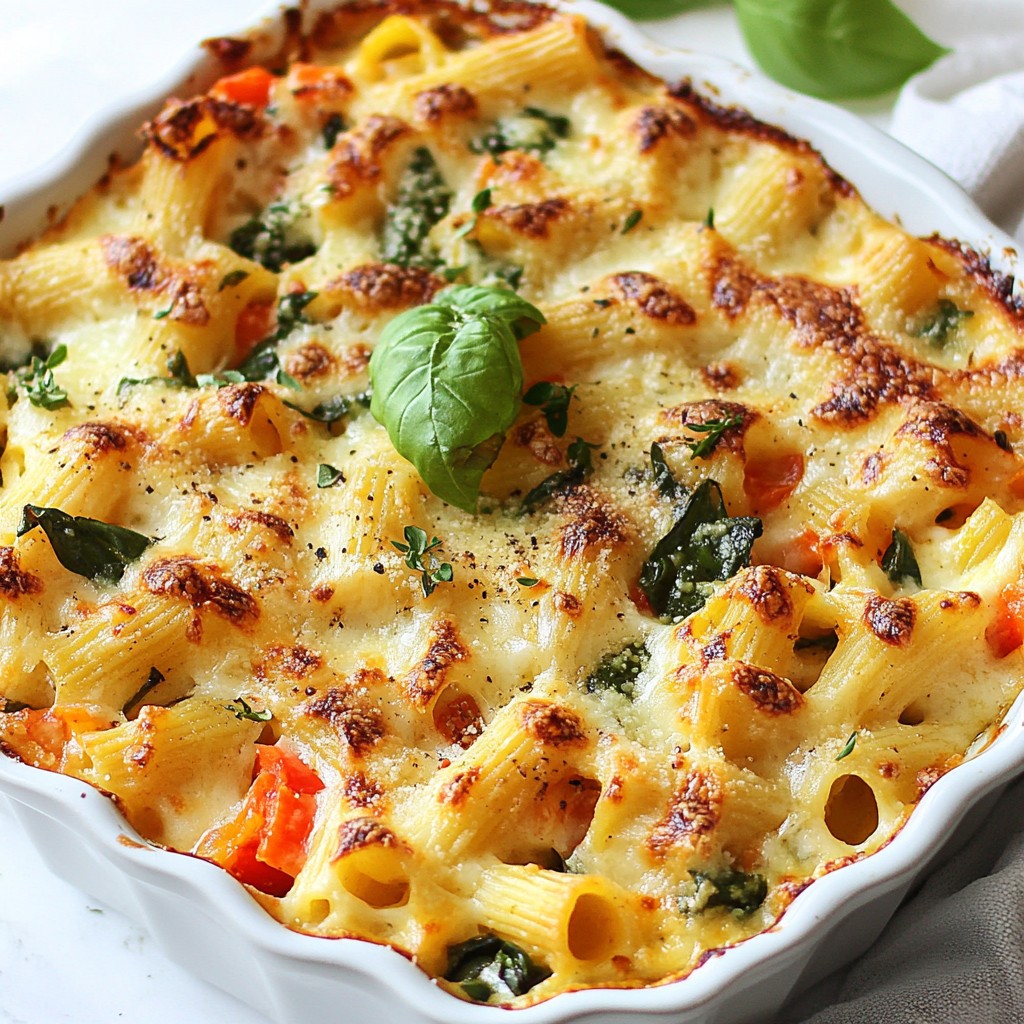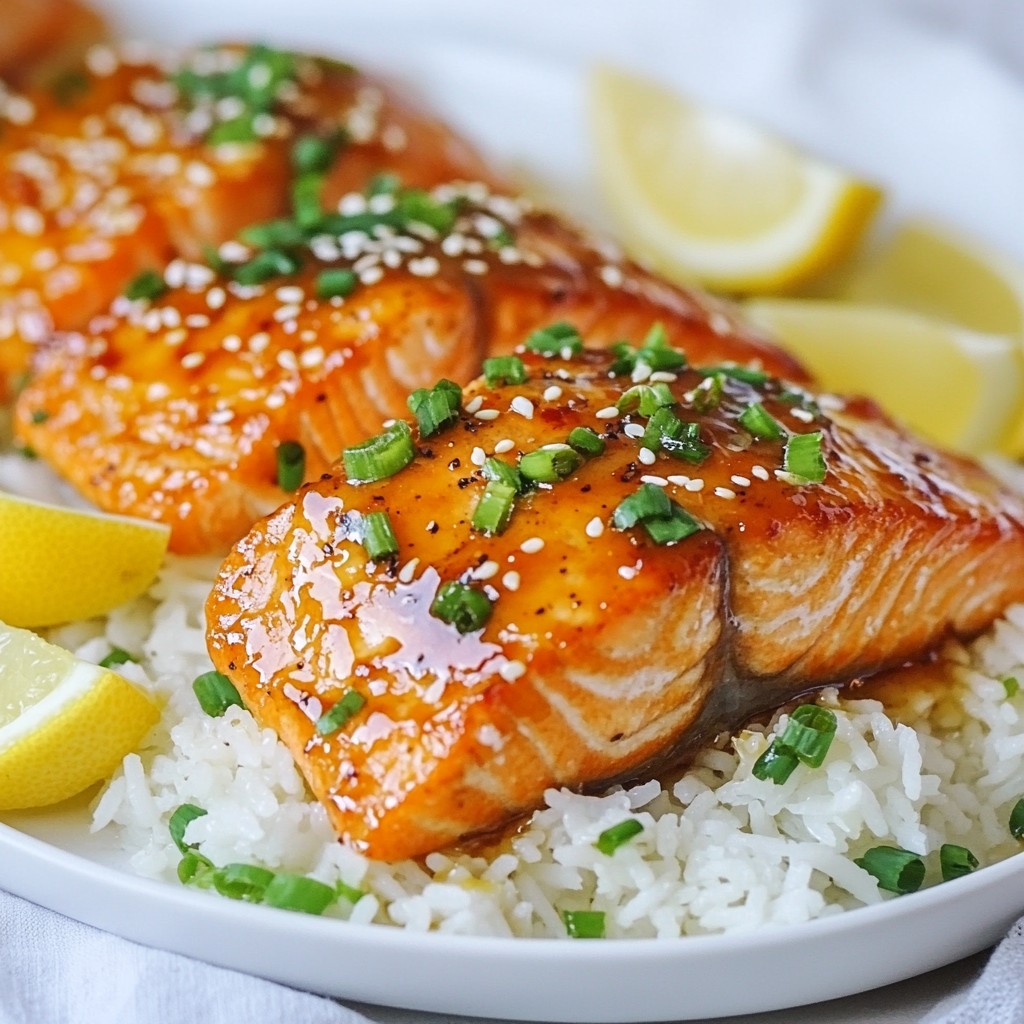Cauliflower Fried Rice is a tasty, healthy twist on a classic dish. You can enjoy all the flavor while keeping it light. In this simple recipe, I’ll guide you through making a delicious meal that fits your busy lifestyle. With fresh veggies and a few tips, you’ll savor every bite. Let’s dive into this easy, nutritious recipe that can transform your dinner table!
Ingredients
Essential Ingredients for Cauliflower Fried Rice
– 1 medium head of cauliflower (about 4 cups riced)
– 1 cup peas and carrots (frozen or fresh)
– 1 red bell pepper, diced
– 1 green onion, finely chopped
– 2 cloves garlic, minced
– 1 tablespoon ginger, minced
– 2 large eggs, lightly beaten
– 3 tablespoons soy sauce (or tamari for gluten-free)
– 1 tablespoon sesame oil
– Salt and pepper to taste
– Fresh cilantro, chopped (for garnish)
– Sesame seeds (for garnish)
These ingredients create a colorful and tasty meal. The cauliflower acts as a rice substitute, which adds fiber and nutrients.
Optional Ingredients for Customization
You can add your favorite veggies or proteins. Here are some ideas:
– Broccoli florets
– Bell peppers in different colors
– Cooked chicken, shrimp, or tofu
– Mushrooms for a meaty texture
– Spinach or kale for extra greens
Customizing your fried rice makes it fun and suits your taste.
Health Benefits of Using Cauliflower
Cauliflower is low in carbs and calories. It is rich in vitamins C and K. Here are some benefits:
– High in fiber: Great for digestion.
– Antioxidants: Help fight inflammation.
– Versatile: Can replace grains in many dishes.
Using cauliflower in fried rice makes a healthy choice. You enjoy great flavors while getting essential nutrients.
Step-by-Step Instructions
Preparing the Cauliflower
To make this dish, start with a medium head of cauliflower. Chop the florets into smaller pieces. You want them to fit into your food processor. Pulse them until they look like rice grains. This should give you about four cups of riced cauliflower. Set it aside, and let’s get cooking!
Cooking the Vegetables and Eggs
Heat a large skillet or wok on medium-high heat. Add one tablespoon of sesame oil to the pan. Wait until the oil is hot, then add two cloves of minced garlic and one tablespoon of minced ginger. Sauté these for about 30 seconds. The smell will be amazing! Now, toss in one diced red bell pepper. Cook it for 2-3 minutes until it gets soft. Next, add in one cup of peas and carrots. Stir them for another two minutes until they are warm.
Push the veggies to one side of the skillet. Pour in two large beaten eggs on the other side. Scramble them until they are fully cooked. Mix the eggs with the veggies.
Mixing the Ingredients and Final Cooking Steps
Now, it’s time to add the riced cauliflower! Stir it into the skillet with the eggs and veggies. Pour in three tablespoons of soy sauce. Keep stirring for 5-7 minutes. You want the cauliflower to be tender but still a bit firm. Season with salt and pepper to your taste. If you like more flavor, add more soy sauce.
Finally, stir in some finely chopped green onion just before you serve. This adds a fresh crunch. Enjoy your colorful cauliflower fried rice!
Tips & Tricks
Achieving the Perfect Texture
To get the best texture, start with fresh cauliflower. Ricing it is key. Use a food processor for even pieces. If you don’t have one, chop by hand. Make sure to pulse it until it looks like rice. Avoid over-processing, or it will turn mushy. You want a light, fluffy texture. When cooking, stir often. This helps prevent sticking and ensures even cooking.
Flavor Enhancements and Seasoning Tips
To boost flavor, use fresh garlic and ginger. They add warmth and depth. Don’t skip the sesame oil; it brings a nutty taste. Feel free to adjust the soy sauce based on your taste. If you want a kick, add some chili sauce. Fresh herbs like cilantro make a tasty garnish. They add freshness and color. Experiment with other veggies too. Broccoli or snap peas work well.
Common Mistakes to Avoid
One common mistake is using too much liquid. This can make your fried rice soggy. Always use a hot pan and cook in small batches. Another mistake is not cooking the cauliflower long enough. You want it tender but still firm. Lastly, don’t forget to season at the end. Taste as you go, and adjust the salt and pepper. A little extra soy sauce can really enhance the dish.
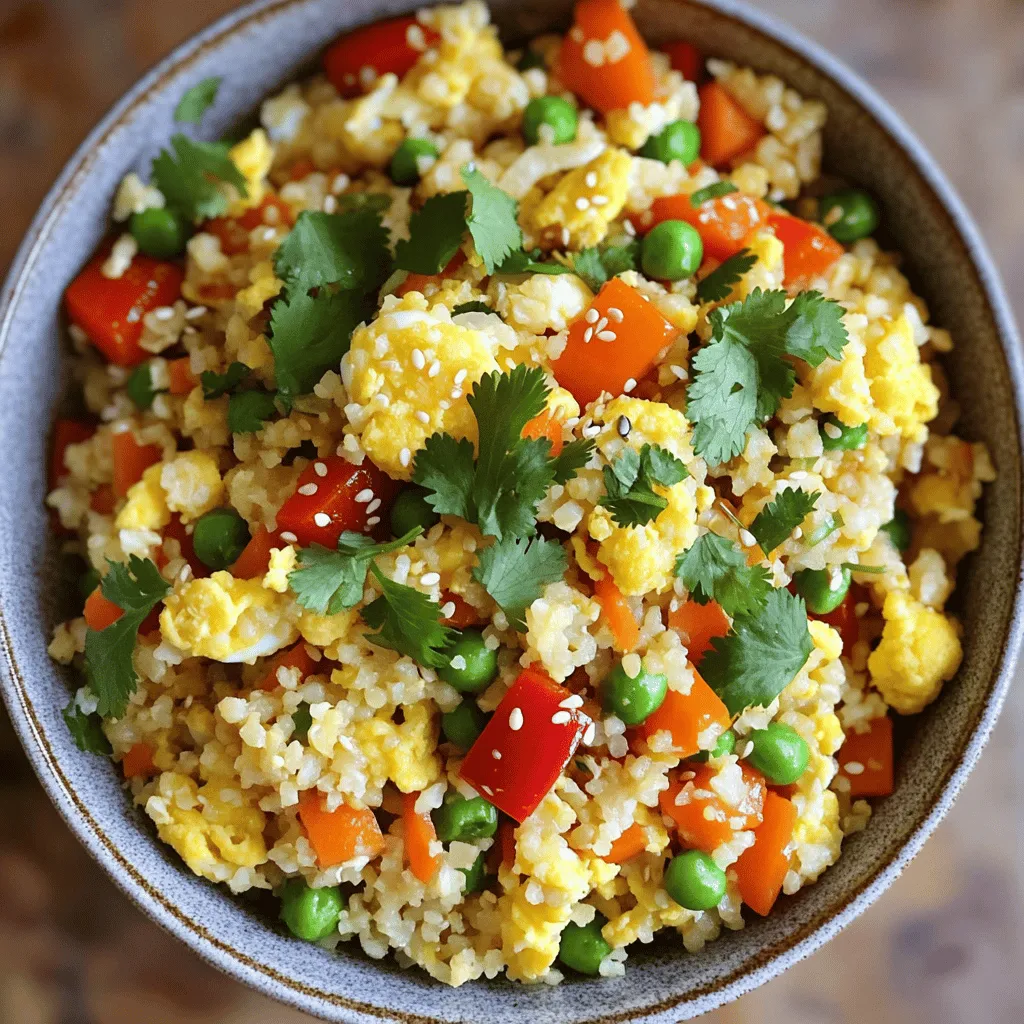
Variations
How to Add Protein (Chicken, Shrimp, Tofu)
You can boost the protein in your cauliflower fried rice easily. For chicken, use cooked, diced breast. For shrimp, add peeled and deveined shrimp to the skillet. Cook them until they turn pink. If you prefer tofu, use firm tofu. Cube it and sauté until golden. Stir it in with the veggies for amazing flavor.
Vegetarian and Vegan Friendly Options
This dish is great for vegetarians and vegans. You can skip the eggs and use tofu instead. Cook the tofu as mentioned before. Use soy sauce or tamari for extra flavor. You can also add more veggies like broccoli or zucchini. This keeps it colorful and nutritious.
Different Flavor Profiles (Spicy, Asian-inspired)
You can change the flavor of your fried rice easily. To make it spicy, add red pepper flakes or sriracha. If you want an Asian twist, try adding hoisin sauce or oyster sauce. A splash of rice vinegar can also add tang. These options let you customize the dish to your taste.
Storage Info
Best Practices for Storing Leftovers
To keep your cauliflower fried rice fresh, store it in an airtight container. Let it cool before sealing. This helps prevent moisture build-up. Place it in the fridge if you plan to eat it within three days. For longer storage, consider freezing.
Reheating Instructions for Optimal Flavor
When reheating, use a skillet over medium heat. Add a splash of water or sesame oil. This adds moisture and flavor. Stir often to heat evenly. You can also microwave it in a bowl covered with a damp paper towel. This helps keep the rice fluffy.
Freezing Cauliflower Fried Rice
To freeze, let the fried rice cool completely. Portion it into freezer-safe bags or containers. Remove as much air as possible to prevent freezer burn. It can last up to three months in the freezer. When ready to eat, thaw it in the fridge overnight before reheating.
FAQs
Can I use frozen cauliflower rice?
Yes, you can use frozen cauliflower rice. Just skip the ricing step. Thaw it first. Drain any excess water to prevent sogginess. Frozen cauliflower rice cooks quickly in the skillet. It saves time and still tastes great.
How do I make this dish gluten-free?
To make cauliflower fried rice gluten-free, choose tamari instead of soy sauce. Tamari is a wheat-free option. Always check labels to ensure no gluten ingredients are included. This way, you can enjoy this dish without worry.
What can I serve with Cauliflower Fried Rice?
Cauliflower fried rice pairs well with many dishes. Try serving it with grilled chicken or shrimp. It also goes great with tofu for a vegetarian meal. Add a side of steamed broccoli or a fresh salad for balance. Enjoy this dish as a light meal or a tasty side.
Cauliflower fried rice is a tasty, healthy option. I shared key ingredients, cooking steps, and helpful tips for great results. Remember to adjust ingredients to suit your taste. Always check for common mistakes to avoid. You can even explore different proteins and flavors. Lastly, storing and reheating properly keeps your dish fresh and delicious. Enjoy crafting this meal and make it your own!
